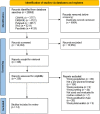Implementation strategies for telemental health: a systematic review
- PMID: 36694164
- PMCID: PMC9873395
- DOI: 10.1186/s12913-022-08993-1
Implementation strategies for telemental health: a systematic review
Abstract
Background: The COVID-19 pandemic resulted in a rapid shift from traditional face-to-face care provision towards delivering mental health care remotely through telecommunications, often referred to as telemental health care. However, the manner and extent of telemental health implementation have varied considerably across settings and areas, and substantial barriers are encountered. There is, therefore, a need to identify what works best for service users and staff and establish the key mechanisms for efficient integration into routine care.
Objective: We aimed to identify investigations of pre-planned strategies reported in the literature intended to achieve or improve effective and sustained implementation of telemental health approaches (including video calls, telephone calls, text messaging platforms or a combination of any of these approaches with face-to-face care), and to evaluate how different strategies influence implementation outcomes.
Methods: A systematic review was conducted, with five databases searched for any relevant literature published between January 2010 and July 2021. Studies were eligible if they took place in specialist mental health services and focused on pre-planned strategies to achieve or improve the delivery of mental health care through remote communication between mental health professionals or between mental health professionals and service users, family members, unpaid carers, or peer supporters. All included studies were quality-assessed. Data were synthesised using the Expert Recommendations for Implementing Change (ERIC) compilation of implementation strategies and the taxonomy of implementation outcomes.
Results: A total of 14 studies were identified as meeting the inclusion criteria from a total of 14,294 records of which 338 were assessed at full text. All ERIC implementation strategies were used by at least one study, the most commonly reported being 'Train and educate stakeholders'. All studies reported using a combination of several implementation strategies, with the mean number of strategies used per study of 3.5 (range 2-6), many of which were reported to result in an improvement in implementation over time. Few studies specifically investigated a single implementation strategy and its associated outcomes, making conclusions regarding the most beneficial strategy difficult to draw.
Conclusions: Using a combination of implementation strategies appears to be a helpful method of supporting the implementation of telemental health. Further research is needed to test the impact of specific implementation strategies on implementation outcomes.
Keywords: Implementation; Mental health; Remote care; Systematic review; Telemedicine; Telemental health; Telepsychiatry.
© 2023. The Author(s).
Conflict of interest statement
NS is the director of the London Safety and Training Solutions Ltd, which offers training in patient safety, implementation solutions and human factors to healthcare organisations and the pharmaceutical industry. The other authors have no conflicts of interest to declare.
Figures
References
-
- AHRQ. Telemental Health 2021. Available from: https://digital.ahrq.gov/telehealth-0.
-
- Wyler H, Liebrenz M, Ajdacic-Gross V, Seifritz E, Young S, Burger P, et al. Treatment provision for adults with ADHD during the COVID-19 pandemic: an exploratory study on patient and therapist experience with on-site sessions using face masks vs telepsychiatric sessions. BMC Psychiatry. 2021;21(1):237. doi: 10.1186/s12888-021-03236-9. - DOI - PMC - PubMed
Publication types
MeSH terms
LinkOut - more resources
Full Text Sources
Medical


